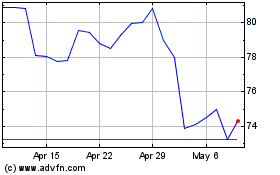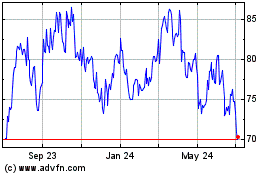Nitrogen Fertilizer Maker CF Industries Names New CFO
May 31 2019 - 7:12PM
Dow Jones News
By Nina Trentmann
The new finance chief of CF Industries Holdings Inc., whose
nitrogen is used to fertilize farmland across the Americas, will
need to guide the company through a turbulent period for U.S.
agriculture.
The company on Friday promoted Christopher Bohn, a company
insider who will start as CFO on Sept. 1. He succeeds Dennis
Kelleher, who is retiring from the company after eight years in the
role.
A continuing trade conflict between the U.S. and China is
causing farmers to rethink which crops to grow -- a calculus that
was expected to benefit the Deerfield, Ill.-based manufacturer. But
floods have delayed the start of the planting season in the Farm
Belt, reducing demand for fertilizer.
While China last year levied 25% tariffs on U.S. soybeans and
corn imports, its appetite for American soybeans far outstrips its
demand for corn. China imported 8.3 million metric tons of soybeans
in 2018, compared with 289,757 metric tons of corn, according to
the U.S. Department of Agriculture. China has historically been the
top buyer of U.S. soybeans.
Soybeans are generally more profitable than corn, but the
Chinese tariffs take away some of that profit. As a result, U.S.
farmers are expected to plant more corn this year and less
soybeans. And while farmers rely heavily on Chinese exports to
drive demand for soybeans, demand for corn is driven by multiple
domestic sources including ethanol production, animal feed, food
ingredients and other uses.
"More corn means more nitrogen fertilizer that's required,
benefiting CF Industries," said Seth Goldstein, an analyst at
Morningstar Inc. Soybeans don't need to be fertilized with
nitrogen, he said.
But because of floods in several U.S. states, farmers have only
planted 49% of their intended corn fields, far below the 80%
average for this time of year, according to the Agriculture
Department.
"Farmers are running out of time to get their corn into the
ground," said Jonas Oxgaard, an analyst at Sanford C. Bernstein
& Co. That could limit demand for CF Industries' products. "If
farmers leave 5% or 10% of fields empty, we will see a significant
impact on their production," Mr. Oxgaard said.
CF Industries in May said sales volumes for the first quarter
were lower compared with the prior-year period because of U.S.
weather.
"Despite the recent challenges, the CFO is coming into a pretty
stable environment" for the company's finances, Mr. Oxgaard
said.
Mr. Bohn has worked for CF Industries for the past decade, most
recently serving as senior vice president of manufacturing and
distribution. In this role, he has overseen the company's nitrogen
plants and distribution facilities in Canada, the U.K. and the U.S.
During his time at the company, he also has held roles overseeing
supply chain corporate planning, CF Industries said in a
statement.
That experience could help the company during a period of
shifting demand.
Two new plants in Louisiana and Iowa will help CF Industries
react quickly to customer demand, which can change based on the
weather or planting decisions based on tariffs, Mr. Oxgaard
said.
The plants helped reduce the company's cash cost of goods sold
per product ton -- an industry efficiency measure -- by about 25%
between 2014 and 2018, Mr. Goldstein said.
Mr. Bohn's base salary will increase to $600,000 from $550,000
and his target bonus opportunity will rise to $480,000 from
$440,000, CF Industries said in a filing with regulators.
Write to Nina Trentmann at Nina.Trentmann@wsj.com
(END) Dow Jones Newswires
May 31, 2019 18:57 ET (22:57 GMT)
Copyright (c) 2019 Dow Jones & Company, Inc.
CF Industries (NYSE:CF)
Historical Stock Chart
From Mar 2024 to Apr 2024

CF Industries (NYSE:CF)
Historical Stock Chart
From Apr 2023 to Apr 2024
